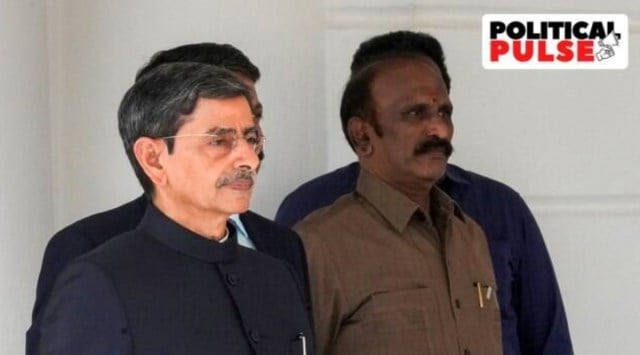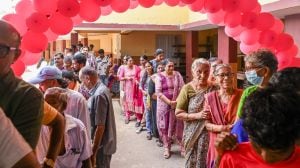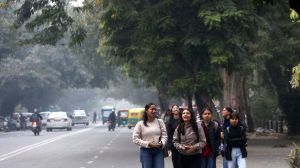TN Governor R N Ravi again: ‘Idea of state identities divisive… dangerous to idea of India’
At an event to mark Telangana formation day, describes states as units created for administrative efficiency, says “all kinds of fictional identities being created”
 At the Raj Bhavan event Friday, Ravi said the idea of “state identities” -- which he ascribed to “divisive psychology” -- was “dangerous to the idea of Bharat” and weakened “the country's unified strength". PTI/File
At the Raj Bhavan event Friday, Ravi said the idea of “state identities” -- which he ascribed to “divisive psychology” -- was “dangerous to the idea of Bharat” and weakened “the country's unified strength". PTI/File
ACCUSED more than once by the Tamil Nadu government of undermining its authority, Governor R N Ravi has walked right into another controversy.
At an event celebrating the foundation day of Telangana at Raj Bhavan in Chennai Friday, Ravi described states as administrative units, created for easier governance, and played down other criteria for the same such as their unique cultures.
He went on to add that these state identities are “unfortunately turning into political identities, that of Malayalis, Tamilians, Biharis, UPites etc…”, describing the same as dangerous to the idea of India.
Tamil Nadu, specifically, prides itself on a distinct “Dravida” identity, and the DMK government led by M K Stalin has consciously courted this, to posit itself as an alternative to the BJP-led Hindutva ideology. Ravi has earlier too stirred the hornet’s rest by raising questions regarding this Dravida identity.
The Governor has also been in conflict with the Stalin government over stalled Bills, earned public ire for calling the anti-pollution protests against Sterlite Copper plant in Tuticorin – which had led to 17 deaths in police firing in May 2018 — as “foreign-funded”, and earlier this year, was pulled up by the Centre for suggesting that Nadu (meaning country) be dropped from the state’s name.
 TN CM M K Stalin and Governor R N Ravi in Chennai. (PTI)
TN CM M K Stalin and Governor R N Ravi in Chennai. (PTI)
At the Raj Bhavan event Friday, Ravi said the idea of “state identities” — which he ascribed to “divisive psychology” — was “dangerous to the idea of Bharat” and weakened “the country’s unified strength”.
“All kinds of fictional identities are being created to undermine the core strength of this country,” the Governor said, adding that this led to a situation such as Telugu-speaking people living in Tamil Nadu calling themselves “migrants”, though they are all Indians.
He added, “… states have been created, and rightly so, to provide efficient administration and governance for the welfare of the people”. “Unfortunately, these are turning into political identities. This divisive psychology, which is being fed day to day, by the preeminence of politics in our life, is dangerous.”
Noting that Kerala, Andhra Pradesh, Karnataka and Tamil Nadu were all created from the Madras Presidency, Ravi said this was how Jharkhand was created from Bihar, Uttarakhand from Uttar Pradesh, Chhattisgarh from Madhya Pradesh and Telangana from Andhra Pradesh. And this was done for administrative efficiency, he said.
Most Indian states were carved out on the basis of linguistic differences. Touching upon such differences, Ravi argued: “There are variations from place to place. Even within a state, there will be variations. In our dance, performances, rituals… What is common is our mythology, our heroes, gods and goddesses. We see that Shiva, Rama, Krishna, goddesses are all-pervasive. What unites us is our rich cultural heritage, with its enormous stunning diversity, in terms of language, cuisine… We see the underlying unity.”
Culture alone has the character of people and society, he said. “We need to retrieve it.”
K Chandru, a retired Madras High Court judge and a political commentator, said Ravi’s statements reflect his limited understanding of culture. “He does not understand that culture stands outside religion… We know that the RSS never endorsed linguistic division of states as it wants a single state, a single language,” said Chandru, accusing Ravi of incessantly trying to “debunk Tamil consciousness”, even while seemingly lauding Tamil culture.
- 01
- 02
- 03
- 04
- 05































